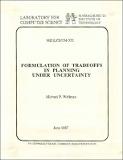| dc.description.abstract | Planning under uncertainty with multiple, competing objectives is impossible when goals are represented as predicates and the effects of actions are modeled as deterministic functions of situations. Decision-theoretic models, on the other hand, do not address the problem of constructing strategies from more primitive representations of actions. In this proposal, I describe a method for formulating plans from large knowledge bases that can accomodate uncertain and partial satisifaction of goals. At the core of the planner is a dominance prover that derives admissibility properties of plan classes. The representation for the effects of actions is based on a qualitative formalism for asserting influences among variables. The planner makes decisions "up to tradeoffs," an intuitive description that seems to characterize the power of a dominance prover based on the qualitative influence formalism. | en_US |
